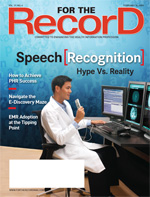Coding for Acute Myocardial Infarction
For The Record
Vol. 21 No. 4 P. 28
Myocardial infarction (MI) is the death of myocardial tissue usually caused by a blocked coronary artery. Acute MI (AMI) is classified to ICD-9-CM category 410, with a fourth and fifth digit needed to completely code the condition.
The fourth digit specifies the site involved. More than one code from category 410 may be assigned to fully describe a patient’s condition. For example, if a patient had an AMI of the inferior and anterior walls during the same admission, both 410.41 and 410.11 may be assigned (AHA Coding Clinic for ICD-9-CM, 1993, fifth issue, page 14). However, if the patient had an extension of the MI (reinfarction) of the same site during the same admission, only the initial infarction would be coded. No additional code for the reinfarction would be assigned (AHA Coding Clinic for ICD-9-CM, 1993, fifth issue, page 13).
Code 410.7x, Subendocardial infarction or nontransmural infarction, identifies subendocardial infarctions that do not extend through the full thickness of the myocardial wall (ICD-9-CM Coding Handbook, Faye Brown, 2004, page 255). Code 410.7x also includes non-ST elevation MI (NSTEMI). The initial electrocardiogram (ECG) for patients with NSTEMI does not show ST-segment elevation. Most patients who present with NSTEMI do not develop new Q waves on the ECG and are ultimately diagnosed as having experienced a non–Q-wave MI. NSTEMI is distinguished from unstable angina by the detection of cardiac markers indicative of myocardial necrosis in NSTEMI and the absence of the abnormal elevation of such biomarkers in patients with unstable angina.
Another type of MI is ST-elevation MI, which typically goes all the way through the heart wall muscle. Therefore, it is assigned to code 410.x1, with the fourth digit identifying the specific location of the MI.
Code 410.9x, Myocardial infarction of unspecified site, should only be assigned when there is no documentation specifying the location. Although not a reliable diagnostic tool, the ECG report is a reliable source of information regarding the AMI site. If a diagnostic report (eg, ECG), provides specificity to a confirmed diagnosis (MI), it is appropriate to assign the more specific code (AHA Coding Clinic for ICD-9-CM, 1999, first quarter, page 5).
Acute coronary syndrome (ACS) and acute ischemic syndrome are terms often used to indicate unstable angina or even MI. ACS is classified to code 411.1 and acute ischemic syndrome to code 411.89 per ICD-9-CM coding directives. However, if a patient record has evidence that an AMI may have occurred, it may be appropriate to query the physician for clarification of the final diagnosis.
Because there is no distinct code for demand ischemia, it is recommended that coders query a physician for clarification of the appropriate code assignment. If no additional clarification can be obtained, assign code 411.89 for acute demand ischemia. This is unofficial advice, since there is no direction provided in AHA Coding Clinic for ICD-9-CM. Please note that to assign code 411.89, the physician must state that it is an acute condition, and it must be related to the coronary arteries.
The fifth-digit subclassification for category 410 identifies the episode of care. A fifth digit of 1 indicates the first time the patient was seen and treated for MI and may be used at the first hospital where the patient received treatment and at other acute care hospitals to which the patient is subsequently transferred (without interim discharge). For example, if a patient was admitted to Hospital A for AMI and then transferred to Hospital B for a cardiac bypass, code 410.x1 would be assigned as the principal diagnosis for both acute care hospital stays. If the patient was then readmitted to Hospital A for recovery without being discharged home, code 410.x1 could still be assigned as the principal diagnosis.
A fifth digit of 2 is assigned when a patient is admitted for subsequent care of an MI after the initial care but within eight weeks of the initial MI. Assign code 414.8 if the MI is described as chronic or lasts for eight weeks or longer.
If a patient was readmitted with an extension of an MI, it is considered a brand-new MI of the specified site, regardless of whether it occurred in the same location as the original infarct or extended to a new location; it is further death of the tissue. Because the patient was released and cardiac enzymes were normal, there will be a new rise in enzymes, and the new infarct will be treated with the same treatment plan as before. According to AHA Coding Clinic for ICD-9-CM, 1989, third quarter, pages 3-4, “Any subsequent episode of care for another (repeat) myocardial infarction is also assigned the fifth digit 1.”
Sometimes, the MI extends to the same site while in house for the original MI. In that case, it is not considered an extension, since it was at the same site during the same admission. However, if it extended to a different location during the same admission, then assign an additional code from category 410 with a fifth digit of 1 to show the new site to which it extended (Coding Clinic, 1993, fifth issue, pages 13-14.)
Coding and sequencing for AMI are dependent on the physician documentation in the medical record and application of the Official Coding Guidelines for inpatient care. Also, use specific AHA Coding Clinic for ICD-9-CM and American Medical Association CPT Assistant references to ensure complete and accurate coding.
— This information was prepared by Audrey Howard, RHIA, of 3M Consulting Services. 3M Consulting Services is a business of 3M Health Information Systems, a supplier of coding and classification systems to more than 4,000 healthcare providers. The company and its representatives do not assume any responsibility for reimbursement decisions or claims denials made by providers or payers as the result of the misuse of this coding information. More information about 3M Health Information Systems is available at www.3mhis.com or by calling 800-367-2447.



